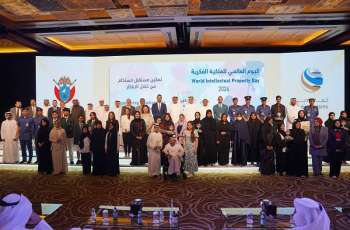MOSCOW (Pakistan Point News / Sputnik - 24th August, 2018) Russian President Vladimir Putin will meet with his Abkhazian counterpart Raul Khadzhimba in Moscow on Friday, timed to the 10th anniversary of Russia's recognition of the independence of the breakaway region.
On August 26, 2008, then Russian President Dmitry Medvedev signed a decree recognizing Abkhazias independence, and diplomatic relations were established a few weeks later on September 9.
By recognizing the independence of Abkhazia, Russia acted as a guarantor of its existence as an independent state and a peaceful future for the Abkhazian people. Interstate relations are progressively developing on the basis of a mutual alliance and strategic partnership.
Moscow-Sukhumi relations are regulated by more than 100 bilateral documents signed at various levels, including the fundamental Treaty of Friendship, Cooperation and Mutual Assistance of September 17, 2008 and the Treaty on Alliance and Strategic Partnership of November 24, 2014.
The political dialogue between the two states is intensive. On August 27, 2014, a meeting between Russian President Vladimir Putin and Khadzhimba took place in Novo-Ogaryovo, located in the Moscow Region. The next meeting between the two leaders was held on November 24 that same year in Russia's Black Sea resort city of Sochi, during which they discussed a wide range of issues related to bilateral cooperation as well as the situation in the region. In May 2015, Putin and the Abkhazian president met again in Sochi to discuss prospects for enhancing bilateral cooperation. The leaders met twice in 2016 � in February and December.
Putin visited Abkhazia's resort town of Pitsunda on August 8, 2017. The high-level negotiations focused specifically to the issue of Abkhazias evolution into a modern state with an efficient and self-sufficient economy.
This year, Khadzhimba attended the closing match of the World Cup in Moscow that took place on July 15.
The Moscow-Sukhumi dialogue is also maintained at the ministerial level. On November 2-4, 2016, Minister of Foreign Affairs of Abkhazia Daur Kove paid a working visit to Russia.
On April 18-19, 2017, Russian Foreign Minister Sergey Lavrov paid a working visit to Abkhazia and held talks with Khadzhimba and Kove. The officials discussed strengthening bilateral relations, as well as key areas of cooperation in regional and international affairs. Lavrov also met with Abkhazian Prime Minister Beslan Bartsits and took part in the official opening ceremony for a new complex of buildings of the Russian Embassy in Abkhazia.
Interparliamentary ties have also been actively developing. Russian and Abkhazian delegations are working closely together in the Geneva Discussions on Security and Stability in the Southern Caucasus, launched after the 2008 military conflict in South Ossetia. The main objective of the consultations is to ensure the lasting security of Abkhazia and South Ossetia. Russian and Abkhazian representatives at the Geneva discussions usually speak with one voice on issues that are crucial for regional security, such as the conclusion of legally binding agreements on the non-use of force to counter Tbilisi's confrontational steps in the international arena and Georgia's militarization in the context of its interaction with NATO.
Russia has traditionally been the main economic partner of the Republic of Abkhazia. According to the Russian Federal Customs Service, Russias trade with the region totaled $260,594 million in 2017, with Russia exporting $206,958 million worth of goods and importing $53.635 million in goods. Abkhazia was ranked 90th in terms of Russian imports in 2017.
In the first half of 2018, trade between Russia and Abkhazia amounted to $109,885 million. Russian exports totaled $86,441 million, while imports reached $23.443 million.
Russia exports food products, agricultural commodities, mineral products, machinery, equipment and vehicles, as well as chemical industry products, metals, wood, pulp and paper products to Abkhazia.
Russian imports consist mainly of food and agricultural commodities. Abkhazia is one of the top five countries supplying wine to the Russian market, exporting 2.7 billion rubles ($39.7 million) in wine products to Russia in 2017 alone.
Russia provides large-scale financial assistance to Abkhazia, forming about 50 percent of the country's budget.
Russia also invests into the socioeconomic development of Abkhazia. A program that has been created for this purpose is currently being implemented and envisages the allocation of some 6 billion rubles between 2017 and 2019. The funds go toward restoring social facilities, roads, the energy sector, among other things. About 70 projects were put into operation in 2017 within the framework of the socioeconomic development program.
This work is coordinated within the framework of the Intergovernmental Commission on Social and Economic Cooperation between Abkhazia and Russia. The body held a regular meeting on December 8, 2017.
Due to the complex situation in the region, cooperation in the security sphere is particularly important. Georgia still considers the territories of Abkhazia and South Ossetia its own, and refuses to negotiate with the republics the non-use of force. In accordance with relevant bilateral agreements, a Russian military base has been established in Abkhazia, with Russian border guards assisting Abkhazian military in protecting its Georgian border.
The federal law on "the Ratification of the Agreement Between the Russian Federation and the Republic of Abkhazia on a Joint Group of Armed Forces of the Russian Federation and the Republic of Abkhazia" was signed by Putin on November 22, 2016.
Interregional links, the establishment of which started even before Russia recognized Abkhazia's independence, are developing dynamically.
Abkhazia is one of the most popular tourist destinations among Russians. According to Russia's Federal Agency for Tourism, more than 4.3 million tourists from Russia visited Abkhazia in 2017.



